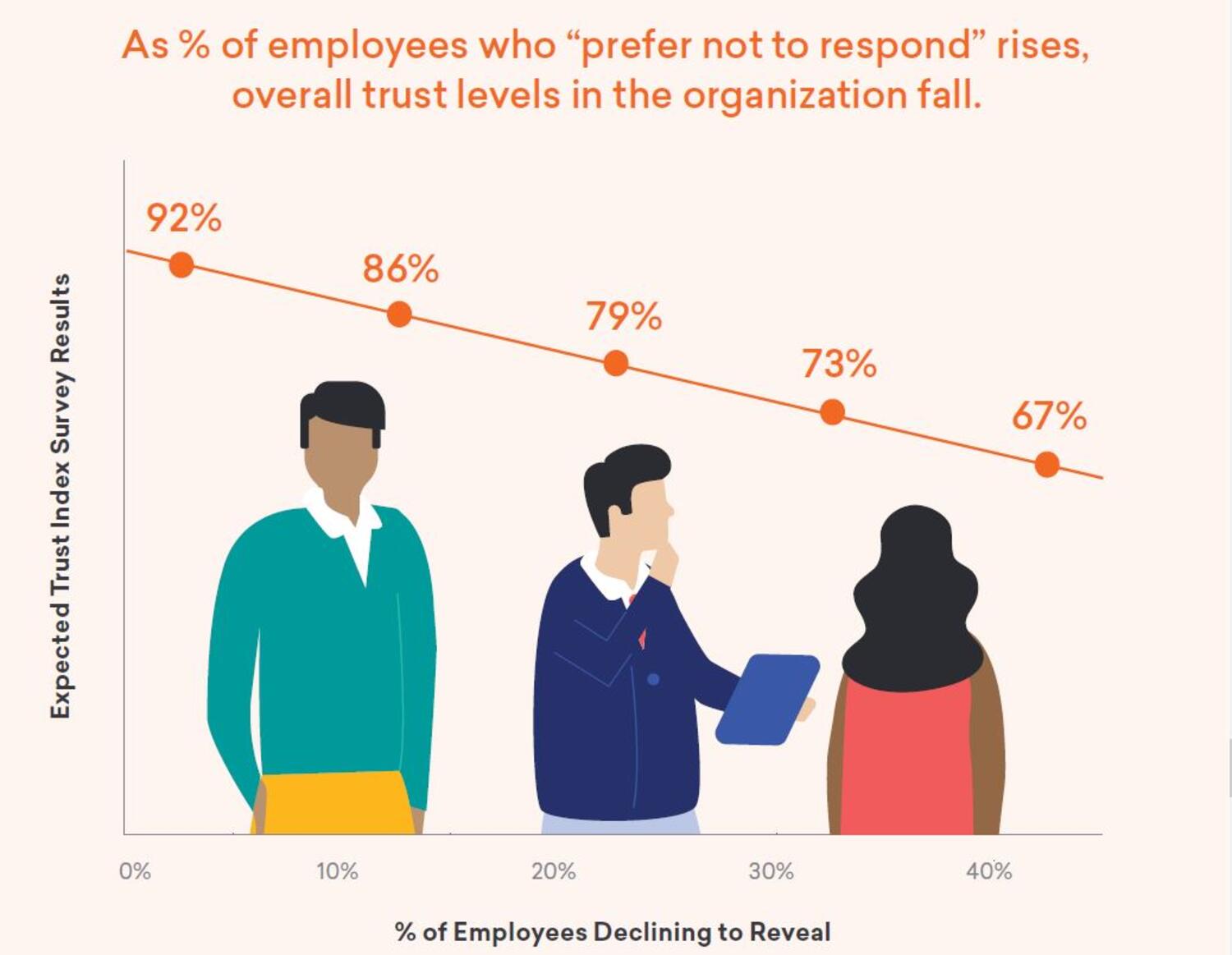By Claire Hastwell and Chandni Kazi.
When people choose not to reveal parts of their identity, they're telling you a lot.
Pride Month is about showing up and being accepted for exactly who you are. And here at Great Place to Work®, we believe employees shouldn’t have to disguise themselves to “fit in” at work. Our research shows this not only hurts belonging but also lowers self-esteem and employee engagement.
On the surface, it might look like your workplace has created a positive employee experience for people who identify as LGBTQ+. But underneath the rainbow Pride flags, is this true?
One of the things that businesses value about our Trust Index™ employee survey is that it uncovers the “masked” workplace experiences for different employee groups, including those who identify as LGBTQ+.
Part of doing this involves asking several questions about employees’ personal characteristics. That way, companies can identify disparities in the workplace experience for different groups of employees.
Identifying these disparities is the first step in correcting them and creating a better, more equal experience for all employees. These can be sensitive questions, so we give people the option to decline to respond to questions about their sexual orientation or gender identity.
You might expect only a small percentage of employees choose this “prefer not to respond” option. It turns out, however, that one in eight employees actively decline to reveal one or more aspects of their identity.
What’s happening here? Why are over 12% of employees declining to share information about themselves?
Why employees choose “prefer not to answer”
To get to the bottom of this issue, we studied the written comments from employees who declined to respond to one or more of these survey questions. Their comments often provide some clarity, or at least clues, around why these employees don’t want to reveal their whole selves.
Common themes from these employees’ experiences include:
- A climate of favoritism
- Toxic work relationships
- Passive aggressiveness
- A lack of trust to speak up
- Fear of retaliation
Harassment may not define the kind of workplace environment those themes describe. But it’s easy to see them as “harassment adjacent” — rife with microaggressions and fear.
What these (non-)responses say about your company culture
When people choose not to reveal parts of their identity, they're actually telling you a lot about how they feel at work.
We analyzed these “masked” survey responses from 1,600+ companies. One employee who left this part of their identity hidden writes, “How can you trust a system/business that rewards its malicious employees...? It’s quite discouraging for those who are aware of the offense.”
Another comments, “I don’t have full trust in our HR department. I would not share confidential information with them because I do not feel it would stay confidential.”
There are clear ties between consistently inclusive workplace cultures and overall employee experience and engagement. If employees decline to reveal their full selves on surveys, it suggests your workplace may not be a psychologically safe environment for people of all gender identities and sexual orientations.
As more people choose not to respond, trust and innovation suffer.

The pattern is particularly striking for how people answered questions about their sexual orientation and disability status. For every two people who positively identified as LGBT or living with a disability, three actively refused to share their identity.
This ratio has a big impact on a company’s overall workplace culture.
According to our data, for every 10% of employees that chose not to respond, there was a 6-point decrease in a company’s overall levels of trust, pride and camaraderie.
More specifically, as the percentage of employees’ choosing ‘prefer not to respond’ grows, there are drops in:
- Employees’ faith in management
- Their sense of safety in the work environment
- Signs of teamwork

These are all critical to effective innovation and strong business results. A high rate of “prefer not to respond” answers in your employee survey data suggests that your business may not be positioned to thrive, particularly during economic downturns.
Learn how treating people of all sexual orientations can help your workplace thrive
Choosing “prefer not to respond” is a signal of fear in the workplace. Organizations can use this insight to:
- Tailor their D&I strategies
- Find undiscovered pockets of strength
- Monitor people’s ability to bring their full selves to work
Every person deserves the freedom to show up as their true self. And when employees bury their identities, it speaks volumes about the level of psychological safety at your workplace.
To learn how to use employee survey data to tune into these signals and take effective action, contact us here.

